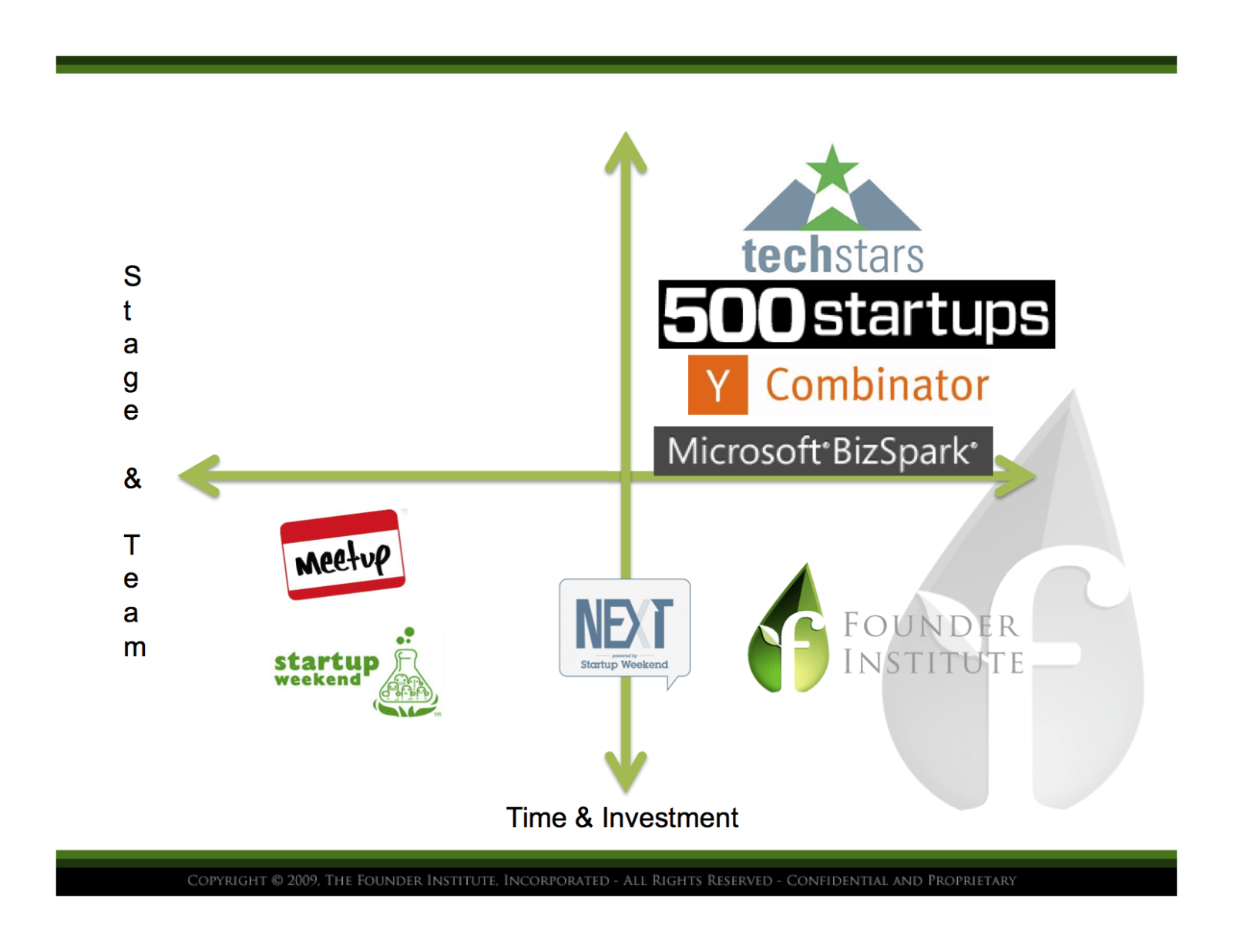Comparing Accelerators and Incubators
Which program is right for your startup? The answer to that question depends on a number of factors, including you, your idea and your team. I recently gave a talk at the Northwest Entrepreneur Network University (NWENU) about Accelerators, Incubators and the Startup Ecosystem, specific to Seattle, but the general rules apply as well.
Start with You
Where are you in your startup life cycle?
- Pre-Idea – do you have two or three ideas that you’re working on and you don’t know which one is best?
- Pre-Product – you have a market and an idea, but you need to know how to build a product and/or find a technical co-founder
- Pre-Revenue – you’ve built a product, but you need to know how to do go-to-market sales and marketing as well as financial modeling
How about commitment level?
- Full Time – You’re ready to leave the borg and jump into your startup full time!
- Part Time – You have a family and need the benefits, so you’d like to jump, but want to validate the idea first – good choice, start part time.
Program Types
- Meet ups – are the lowest commitment level of events and programs. It’s a great way to connect with other people who are interested in Entrepreneurship or tech and programming, but it’s just a meet up.
- Startup Weekend – has become a movement worldwide. It’s a great place to connect with other potential startup-ers and share your idea, work on a project, get some skills, launch a beta version in 54 hours. If you’re a business person and can’t code or design, you’ll have some limitation on your contribution.
- Startup Weekend Next – is just that, it’s what to do after a Startup Weekend. It’s for TEAMS and you need to have an Idea.
- Incubators – have an implication of space, cash and adult supervision, it also rings of days gone by. Chris Devore wrote a great post here at Crash Dev, comparing Incubators to Accelerators, so I won’t duplicate that post – other than to say, to quote Chris: “(a founder) isn’t in need of adult supervision. Help them get where they’re going or get the f*** out of the way.”
- Accelerators – have deadlines and deliverables over a 3-4 month period. I would put them into the right hand column of the slide.
- Full Time Programs – The top right quadrant represents the programs that require a team and idea, and a full time commitment, even if it’s only for a 90 day period. If you have those three requirements you should apply for one or all of those programs. You may need to move if it’s not in your city but you’ll get a great jump start on launching your company.
- Part Time Programs – Founder Institute is the only program that takes both solo founders and teams, as well as Idea stage and pre-revenue stage startups. To graduate from the Founder Institute you’ll need a demo, be incorporated, have a customer validated financial model (aka a venture ready financial model), an investor deck and executive summary. At that point, you can decide if you’re ready to leave your day job and jump into your company full time.
Regardless of which full or part-time program you want to apply for (or qualify for), there are some clear advantages of involvement. Inc Magazine called these programs the new B-school. You’ll create a new network of connections and you’ll be side by side with people who have similar goals. You’ll also meet mentors that are based in your city, folks who have done what you’re trying to do. Be careful here that the mentor list isn’t a list of service providers. Yes, they can help you with services, but if they haven’t built a startup from scratch they will only have theory to contribute to that effort. In addition, you should be able to knock out the blocking and tackling topics as well. These include: Legal, research, financial models, presentations, etc.
Other Resources
- Non-Profits & Organizations – NWEN is a great example in Seattle of a non-profit serving the entrepreneur community for over 25 years. They bring programs, speakers and office hours to an otherwise unruly group of entrepreneurs. Associations like the Washington Technology Association has other resources and programs, usually for more mature companies.
- Co-working – having a place to connect with your team is important and often a coffee shop isn’t the best option. They may provide speakers and other resources and having a month to month commitment on office space is a great choice for a startup.
So what option is best for you and your startup?

jcdickens
Dave-
Great working model for start ups to consider where they sit and resources available.
I would also be happy to introduce folks to the William Factory Incubator http://www.williamfactory.com/ in Tacoma WA which is rapidly growing as a tech resource for early stage Tech companies.
Thanks Again